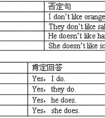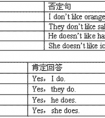单句改错。1. I think that the zoos apply clean and safe places for endangered animals to live in. 2. I support the protection of environment. I stopped to us-九年级英语
一般过去式:
Did+主语+动词原型+其他
考点名称:不定代词
- 不定代词:
即不指明代替任何特定名词或形容词的代词。
初中常用不定代词有:
some(something,somebody,someone),any(anything,anybody,anyone), no(nothing,nobody,no one),
every(everything,everybody,everyone,),all,each,both,much,many,(a)little,(a)few,other(s),
another,none,one,either, neither等。一般来讲,修饰不定代词的词要置于其后。 不定代词用法例举:
①一般用于肯定句中的不定代词:some, someone, somebody, something
例如:They can speak some Japanese.
②一般用于否定句、疑问句和条件句中的不定代词:any, anyone, anybody, anything
例如:Is there anyone at home?
③一般用于句中表示否定意义的不定代词:no, no one, nobody, nothing
例如:I have no watch.
There is nothing wrong with the machine.
④不定代词one指代可数名词,既可指人,亦可指物,它可以代替上文中出现的单数可数
名词,指代复数名词时可以用ones。
例如:I do not have a pen, can you lend me one?
I like small cars better than large ones.
⑤none通常只用作名词,在句中作主语、宾语等。意为“没有任何(人或物)”,既可指人,亦可指物。
none后常跟of短语,其后用复数可数名词或不可数名词。
例如:None of them knows the answer to the question.
⑥both, all
both指两个人、物或群体;
all指三个以上的人、物或群体或泛指一切事物。
例如:My parents are both teachers.
All of my friends are football fans.
⑦every, each
each一般用于指两个或两个以上的人或物,侧重个别;
every用于指三个或三个以上的人或物,侧重全体。而且each所指对象在上下文中已十分明确。
例如:Each student went to see that films. (学生至少二人)
Every student went to the park.(学生至少三人)
⑧other, the other, others, the others, another
other具有名词和形容词性质,既可指人,亦可指物。other常与定冠词the连用。
不定冠词an与other连用则组成another。other只作形容词或代词,表示“其他的,别的”,不可单独使用。
例如:Do you have any other questions?
the other作形容词或代词,特指两者中或两部分的另一个或另一部分。
例如:The bookshop is on the other side of the street.
others相当于“other+名词”,泛指“别的人或物”,只有名词性用法。
例如:Some are planting trees, others are watering them.
the others相当于“the other+名词”,表示“剩下的,其余的”,特指除此之外的全部 人或物。
例如:There are forty-six students in our class. Two of them are foreign, the others are all Chinese.
another作形容词或代词,泛指三个或三个以上不定数目中的“另一个”。
例如:This pen is too expensive, please show me another.
⑨either, neither
either指“两者中的任何一个”;neither指“两者中无一”,具有否定意义。
例如:You can take either half.
Neither of the books is good.
⑩many, much, most
many和much具有名词和形容词的性质,都表示“许多、大量”。
Much一般只能指代或修饰不可数名词,many只能指代或修饰复数可数名词。Most指“大部分、大多数”。
例如:Many boys like playing soccer.
We have much homework to do every day.
Most students think so.
(11)few, a few, little, a little
a few 和a little 意为“少数、少量”,其意义是肯定的。
A few指代或修饰复数形式的可数名词,a little指代或修饰不可数名词。
Few 和little意为“几乎一点没有”,具有否定意义。
例如:He has a few friends here.
Hurry up! There is little time left.- 不定代词的用法:
不定代词大都可以代替名词和形容词,在句中作主语、宾语、表语、定语和状语。
位置
不定代词+形容词
不定代词+to do
作主语
Both of them are teachers.他们两人都是教师。
作宾语
I know nothing about this person.我对这个人一无所知。
作表语
This book is too much for a child.这本书对一个小孩来说太难了。
作定语
There is a little water in the glass.玻璃杯里有一些水。
作状语
I can't find my book anywhere.我在任何地方都不能找到我的书。
修饰不定代词的词,一般情况下要后置。
考点名称:系动词
- 系动词:
亦称连系动词。作为系动词,它本身有词义,但不能单独用作谓语,后边必须跟表语,亦称补语(形容词),构成系表结构说明主语的状况、性质、特征等情况。 - 系动词的分类:
1)状态系动词
用来表示主语状态,只有be一词,例如:
He is a teacher. 他是一名教师。(is与补足语一起说明主语的身份。)
2)持续系动词
用来表示主语继续或保持一种状况或态度,主要有keep, rest, remain, stay, lie, stand, 例如:
He always kept silent at meeting. 他开会时总保持沉默。
This matter rests a mystery. 此事仍是一个谜。
3)表像系动词
用来表示"看起来像"这一概念,主要有seem, appear, look, 例如:
He looks tired. 他看起来很累。
He seems (to be) very sad. 他看起来很伤心。
4)感官系动词
感官系动词主要有feel, smell, sound, taste, 例如:
This kind of cloth feels very soft.
这种布手感很软。
This flower smells very sweet.
这朵花闻起来很香。
5)变化系动词
这些系动词表示主语变成什么样,变化系动词主要有become, grow, turn, fall, get, go, come, run.
例如:
He became mad after that. 自那之后,他疯了。
She grew rich within a short time. 她没多长时间就富了。
6)终止系动词
表示主语已终止动作,主要有prove, turn out, 表达"证实","变成"之意,例如:
The rumor proved false. 这谣言证实有假。
The search proved difficult. 搜查证实很难。
His plan turned out a success. 他的计划终于成功了。(turn out表终止性结果) 系动词使用的注意事项:
系动词本身有一定的词义,不能单独作谓语,后面必须与表语连用。复习系动词时,必须注意以下几个问题:<?xml:namespace prefix = "o" ns = "urn:schemas-microsoft-com:office:office" />1.be是最重要的系动词,主语不同,be的形式也不同,且有时态的变化。
a通常表示主语的特征、状态和身份等,后面接形容词、副词、名词、介词短语、不定式、v-ing、过去分词及表语从句作表语。
b特别要注意“由be+过去分词”所构成的系表结构与“由be+过去分词”所构成的被动语态的区别。
c前者侧重于表示主语的特征或所处的状态,通常没有由by引导的介词短语。
如:The door was closed.
后者侧重于强调主语是谓语动词所示动作的承受者,表示动作;句中可以用由by引导的介词短语。如:The door was closed by me.
d还要注意“由be+ V-ing所构成的系表结构与“由be+ V-ing”所构成的进行时态的区别。
- 最新内容
- 相关内容
- 网友推荐
- 图文推荐
| [家长教育] 孩子为什么会和父母感情疏离? (2019-07-14) |
| [教师分享] 给远方姐姐的一封信 (2018-11-07) |
| [教师分享] 伸缩门 (2018-11-07) |
| [教师分享] 回家乡 (2018-11-07) |
| [教师分享] 是风味也是人间 (2018-11-07) |
| [教师分享] 一句格言的启示 (2018-11-07) |
| [教师分享] 无规矩不成方圆 (2018-11-07) |
| [教师分享] 第十届全国教育名家论坛有感(二) (2018-11-07) |
| [教师分享] 贪玩的小狗 (2018-11-07) |
| [教师分享] 未命名文章 (2018-11-07) |


![How much does it ______ to fly from Yancheng to Hainan Island?[ ]A. cost B. payC. spend D. take-七年级英语](http://www.00-edu.com/d/file/ks/4/2/shiyidongci/2020-01-05/small7dcf2f05998de63e10cc3629787031c81578210087.png)

![He always _____TV in the evening. He _____ listening to the radio. [ ]A. watch, don't like B. watches, doesn't like C. watching, don't like D. watch, do-七年级英语](http://www.00-edu.com/d/file/ks/4/2/shiyidongci/2020-01-05/small45d599b4a60b84e61cec210bfbf051f51578214524.png)
![I'd rather ___ to the Mcdonald's Restaurant because I like to listen to quiet music.[ ]A. to go B. going C. go D. went-八年级英语](http://www.00-edu.com/d/file/ks/4/2/shiyidongci/2020-01-05/small1767bba1727fef2c035c53dcbd9bc20e1578209517.png)
